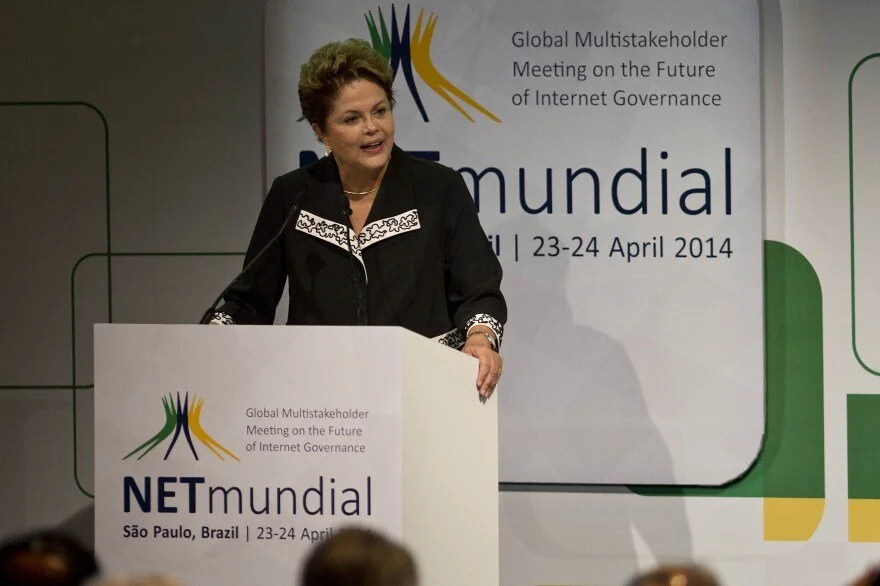NetMundial+10: Between skepticism and uncertainty
Puedes leer la versión en español de este artículo aquí
On April 29-30, NetMundial+10 will take place in São Paulo, Brazil. This event takes place a decade after its first iteration in 2014, which generated great expectation at the time, but was abandoned almost immediately when its organizers sought to move from words to action. Perhaps due to this background, NetMundial+10 has been received with a certain skepticism and the absence of relevant actors does not allow us to know what the fate of this new effort will be.
About NetMundial
For anyone who never heard of NetMundial, this was an Internet governance event organized by the Brazilian government in 2014, largely in response to Edward Snowden's revelations about global surveillance. Its stated goal was to serve as a space for dialogue on principles applicable to Internet governance and the future of the global digital ecosystem, with an open, transparent and multi-stakeholder approach.
In terms of participation, the event was a success and produced a final declaration that, although it now reads conservative, represented a step forward in building consensus on issues such as the application of human rights on the Internet, intermediary liability, mass surveillance and net neutrality. Seeking to capitalize on the success, the organizers promoted that same year the NetMundial Initiative, to move towards the implementation of the declaration, but which eventually foundered due to criticism.
The story of the "failure" of the NetMundial Initiative is well documented on the Internet, but may I suggest the following articles for anyone interested in that soap opera: NetMundial: A lot to love and a lot to hate (April 2014); Internet Governance and the Netmundial Initiative: A Flawed Attempt at Turning Words into Action (August 2014); Internet Society Statement on the Netmundial Initiative (November 2014); Multistakeholderism unmasked: How the NetMundial Initiative shifts battlegrounds in internet governance (January 2015); Apathy continues to overwhelm effort to create an internet ungoverned by America (May 2015).
Nelson Almeida/AFP/Getty Images
NetMundial+10: Back to the origins
Predictably, the event at the end of April is intended to be a continuation of NetMundial, the event, not the initiative. The current process began in March with the opening of a consultation period (now closed) to receive inputs that will allow the organizers to update the statement produced in 2014. During the event itself, comments will be received on a draft that the organizers will make available to participants. It should be noted that as of April 23, this draft has not yet been published.
According to the program, during the two-day event, rounds of dialogue will be held, and the final document will be presented at the closing ceremony, incorporating the comments and suggestions received. Although the times seem excessively short, at least in comparison with similar spaces such as the Internet Governance Forum, this working methodology was the one used in the 2014 edition.
Lower participation reflects a certain skepticism about the process
Despite the support from the Internet community, reflected in a Joint Statement on NetMundial+10 signed by representatives of different stakeholders, including the governments of the Netherlands, United Kingdom and Switzerland, there seems to be some skepticism about the process. For example, just looking at the list of participants in 2014 and 2024, it is clear that NetMundial+10 has attracted just under half as many people and organizations as it did a decade ago.
An important fact is that the decrease in participation corresponds mainly to the government sector, which went from 363 representatives in 2014 to only 73 in 2024. Among the most striking absences are China and Russia, two countries that, despite sharing BRICS membership with Brazil, have decided not to participate in the public consultation or send representatives to the event in São Paulo, as they did in 2014 despite their well-known divisive stance on Internet governance.
While the lower interest could be due to multiple factors, including the existence of other more structured and binding processes such as the Global Digital Compact and WSIS+20, it remains true that NetMundial+10 has not attracted the interest of the most critical sector in the effort to advance the multi-stakeholder governance model.
Uncertainty about the results of NetMundial+10
While the relaunch of a process such as the original NetMundial (open, transparent, participatory) is relevant, especially in a context of crisis of multilateralism, the absence of the majority of governments raises questions about what will happen with the results of the public consultation. Will they be relevant? For whom?
However, not everything is negative with respect to the above-mentioned absences. For example, based on the list of participants, it is foreseeable that the new declaration may advance more progressive positions, something that did not happen in NetMundial 2014 precisely due to the greater participation of the government sector. Topics such as artificial intelligence, children’s rights, the impact of technologies on the environment, and gender may be the ones that can be incorporated into the new declaration.
I will be participating in person at the event, as a representative of the academic sector. If you have any interest in discussing the contents of this article and other related topics, please do not hesitate to contact me.

